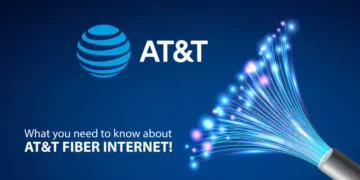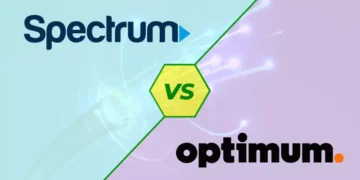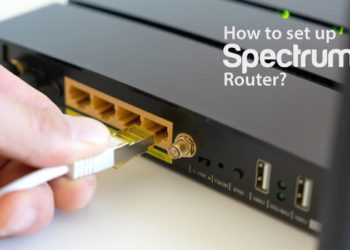Verizon vs. Spectrum - the long-run battle in the ISP world is not unknown. Both Verizon and Spectrum do not impose data caps on their internet plans to ensure freedom in data usage.
Additionally, both ISPs offer the flexibility of no long-term contracts so that you can choose and adapt your desired plan. Verizon and Spectrum have some differences in technology and performance. Verizon leverages cutting-edge fiber-optic technology for unmatched speed and reliability.
On the other hand, Spectrum relies on cable technology that provides good service but potentially faces speed fluctuations and reliability issues, particularly during peak usage.
How do we compare the ISPs for you?
To compare these two ISPs, we primarily gathered relevant data from online customer opinions. Besides, we took note of their experiences and satisfaction levels. We focused on key factors like availability, internet type, maximum speeds, contract requirements, setup charges, equipment fees, price stability, and others before distinguishing between two ISPs.
By analyzing these aspects, we were able to provide a comprehensive overview that might help readers make an informed decision between Verizon and Spectrum for their internet needs.
At a glance comparison
Feature | Verizon | Spectrum |
Availability | 9 states | 41 states |
Internet Type | Fiber, DSL | Cable |
Maximum Speed (Mbps) | 2,300 Mbps | 1,000 Mbps (wireless may vary) |
Contract Requirement | No contract | Free of contract |
Setup Charge | $99.00 (waived online) (Verizon fios community) | $49.99 (Professional Setup) $24.99 (Self Setup) (Spectrum broadband) |
Equipment Fee | No equipment fee | $5.00/mo. for WiFi |
Modem Rental Fee | Waived | No monthly fee |
Price Stability | No annual price increase | Price increases after 12 months |
Customer Ratings (out of 5) | 3.8 (Customer Satisfaction Survey 2021) | 3.6 (Customer Satisfaction Survey 2021) |
Customer Satisfaction Rankings | 2nd for reliability | 3rd for overall satisfaction |
How is Verizon different from Spectrum?
Infrastructure Reliability
Verizon’s fiber-optic infrastructure ensures unparalleled reliability. You can count on a stable connection for work, entertainment, and gaming with dedicated lines. On the other hand, Spectrum relies on cable technology, which can be more susceptible to interference and slowdowns during peak usage times.
Some useful articles you may want to read:
Setup Convenience
Verizon offers a hassle-free setup with a waived fee when you order online. This means you can start enjoying your high-speed internet without extra charges. In contrast, Spectrum charges setup fees.
Equipment Flexibility
With Verizon, you have the flexibility to use your router. Spectrum may charge for equipment, whether you use theirs or not. So, Verizon is a more cost-effective choice in this regard.
No Hidden Fees
Verizon’s transparent pricing policy means no hidden fees or surprise rate hikes after your initial contract period. Spectrum, however, may increase prices after the first year, leaving you with unexpected expenses.
Quality of Service
Verizon’s fiber-optic connection provides a smoother and more consistent online experience. Verizon is unstoppable when dealing with demanding tasks like video conferencing and cloud-based applications. Spectrum’s cable internet may offer a different level of performance and reliability.
Verizon vs. Spectrum! Which ISP has better speed and performance?
Regarding speed and performance, Verizon outshines Spectrum with impressive maximum download speeds of up to 2,300 Mbps, relying on a robust fiber-optic network.
On the flip side, Spectrum offers speed of up to 1,000 Mbps served via cable technology. Therefore, Spectrum’s performance can be susceptible to fluctuations during peak hours.
Verizon’s symmetrical speeds ensure a seamless experience for activities like online gaming and high-definition streaming. Spectrum’s performance is also good but may need to match Verizon’s reliability consistently.
Comparison of the pricing and bundles
Verizon Internet pricing
Plans | Price | Speed | Type |
Internet 300/300 | $49.99 | 300 Mbps | Fiber |
Internet 500/500 | $69.99 | 500 Mbps | Fiber |
Internet 1 Gig | $89.99 | Up to 940 Mbps | Fiber |
Internet 2 Gig | $94.99 | Up to 1,500-2,300 Mbps | Fiber |
5G Home Internet | $50.00, $25.00/mo. for Unlimited mobile subscribers | Up to 300 Mbps | Fixed Wireless |
5G Home Internet Plus | $70.00, $35.00/mo. for Unlimited mobile subscribers | Up to 1,000 Mbps | Fixed Wireless |
Verizon Bundles
Package | Speed | TV channels | Price |
Verizon 300 Mbps Internet + Your Fios TV | Up to 300 Mbps | 125+ | $124.99/mo |
Verizon Fios Gigabit Connection + More Fios TV | Up to 940 Mbps | 300+ | $188.99/mo |
Spectrum Internet pricing
Plans | Price (1st year) | Price | Speed | Type |
Spectrum Internet | $50 | $80 | 300Mbps download, 10Mbps upload | Modem free$5 for router |
Spectrum Internet Ultra | $70 | $100 | 500Mbps download, 20Mbps upload | Modem free$5 for router |
Spectrum Internet Gig | $90 | $120 | 1,000Mbps download, 35Mbps upload | Modem free$5 for router |
Spectrum Bundles
Package | Speed | TV channels | Price |
Spectrum Internet (up to 300 Mbps) + TV Select Signature | Up to 300 Mbps (wireless speeds may vary) | 150 and more | $109.98/mo. for 12 mos. |
Spectrum Internet Ultra + TV Select Signature | Up to 500 Mbps (wireless speeds may vary) | 150 and more | $129.98/mo. for 12 mos |
Which one offers better performance for your home
Verizon outshines Spectrum across several aspects when assessing which ISP offers superior performance for your home.
Performance on Mobile Devices
Verizon’s 5G Home Internet offers speeds of up to 300 Mbps that deliver a fast and reliable connection for mobile devices. In contrast, Spectrum’s wireless speeds may vary, potentially leading to a less consistent mobile experience.
TV and Streaming
Verizon’s robust fiber-optic network delivers seamless streaming experiences for your home. It’s convenient to visit Netflix and other streaming platforms without buffering. Spectrum also shows great performance in this aspect, but Verizon is people’s choice.
Latency/Ping Time
Verizon’s low latency ensures minimal delay in online activities, including real-time gaming and video conferencing on platforms like Zoom and Google Meet. In contrast, Spectrum’s cable technology may introduce slightly higher latency. As a result, you may need help during daily online activities.
Parental Control
Verizon offers comprehensive parental control options to manage and safeguard your family’s online activities effectively. Spectrum provides some parental control features but may offer a different level of customization and security.
International Calling
While both ISPs primarily focus on internet services, Verizon offers an edge with its Verizon Fios Digital Voice. It includes international calling plans. Since Spectrum primarily focuses on internet and cable TV services, Verizon is the more versatile choice if international calling is a priority.
Which ISP to pick for business or official purposes?
For business and official purposes, Verizon emerges as the ideal choice. Its lightning-fast fiber-optic network, incredible speeds of up to 2,300 Mbps, advanced data transfer system, and seamless video conferencing can’t but convince you.
Verizon’s symmetrical speeds, low latency, and dedicated business plans provide a competitive edge. This reliability reduces downtime and enhances productivity, which is a must for businesses and officials.
Which ISP offers better customer service?
When it comes to customer service, Verizon consistently outshines Spectrum. J.D. Power 2021 U.S. Residential Internet Service Provider Satisfaction Study says that Verizon is rated 758, whereas Spectrum gets only 676 points.
According to customer satisfaction rankings from the American Customer Satisfaction Index, Verizon Fios consistently ranks higher with a rating of 75 out of 100.

In contrast, Spectrum lags slightly behind with a 64 out of 100 rating. The gap in customer satisfaction can likely be attributed to Verizon’s superior reliability and connection quality, along with its 100% fiber-optic connection. Therefore, Verizon is the winner for better customer service and overall satisfaction.

Comparison between their contracts
Data Caps
Verizon and Spectrum stand out by not imposing data caps on their internet plans. This means you can use your internet connection without worrying about additional charges for excessive data usage. In this regard, both ISPs are equal.
Contracts
Verizon and Spectrum share a customer-friendly approach by not requiring long-term contracts for their internet services. This flexibility allows you to choose and change your plan without being tied to a contract. Again, it’s a tie between the two ISPs.
Fees
Verizon offers the advantage of no equipment fees, so you won’t incur monthly charges for modems or routers. On the other hand, Spectrum charges a fee of $5.00 per month for Wi-Fi unless you use your router. Verizon wins in this aspect for its cost-saving equipment policy.
Additional Fees
Both ISPs have their set of additional fees, including installation and service activation charges. However, Spectrum’s pro installation fee of $49.99 is notably higher than Verizon’s $99.99 because Verizon waives this fee for online orders. So, Verizon is a more cost-effective choice here.
Hidden Charges
Verizon’s transparent pricing policy with zero annual price increases makes it ideal for customers to encounter hidden charges. In contrast, Spectrum may increase prices after the first year, potentially leading to unexpected expenses. Verizon takes the lead in this aspect by offering greater pricing transparency.
Which ISP offers better area coverage?
Spectrum offers broader area coverage compared to Verizon. Spectrum’s coverage extends across multiple states, including.
- California
- Florida
- Kentucky
- Maine
- New York
- North and South Carolina
- Ohio
- Texas.
In contrast, Verizon’s fiber-based Fios network has a smaller footprint. They’re available primarily in key metro areas within
- Delaware
- New Jersey
- New York
- Maryland
- Massachusetts
- Pennsylvania
- Rhode Island
- Virginia
- Washington, DC.
Therefore, for broader area coverage, Spectrum is the better choice.
Which ISP offers an on-demand content library?
Neither Verizon nor Spectrum offers on-demand content libraries like streaming platforms like Netflix, Amazon Prime Video, or Disney+. If you are looking for on-demand content, you typically subscribe to a separate streaming service in addition to your internet plan from either Verizon or Spectrum.
Comparison of technology
Verizon utilizes cutting-edge fiber-optic technology, which offers superior reliability and speed. In contrast, Spectrum relies on cable technology. Sometimes, it might be more susceptible to speed fluctuations and reliability issues, especially during peak usage times.
Frequently Ask Question
Final Words
When choosing between Verizon and Spectrum, the verdict is clear: Verizon takes the lead. Its lightning-fast fiber-optic technology offers performance and reliability that eliminates Spectrum.
While Spectrum provides a decent, wider range of services, it’s not also negligible, especially when your criteria match. For a top-notch internet experience, Verizon is the clear choice at the end of the day.








